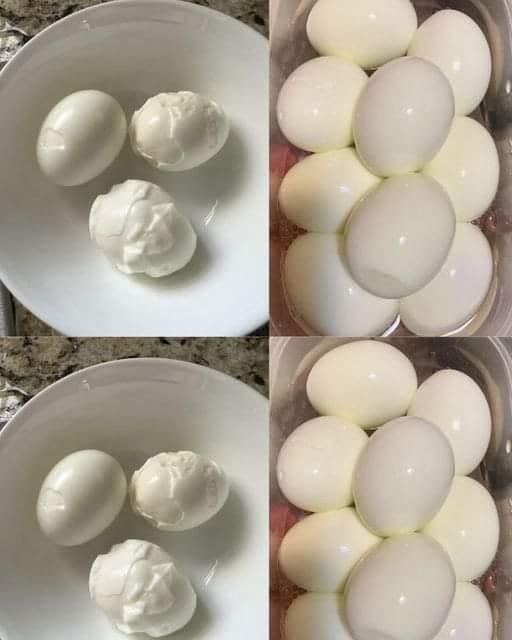ADVERTISEMENT
Chef’s Clever Hack for Perfectly Peeled Hard-Boiled Eggs
Hard-boiled eggs are a kitchen staple—great for breakfast, salads, snacks, or even as the star of deviled eggs. However, one of the most frustrating parts of making hard-boiled eggs is peeling them. Have you ever struggled with bits of shell clinging to the egg white, making a mess of your perfectly cooked egg? It’s enough to make anyone want to give up on hard-boiled eggs altogether.
But don’t worry—there’s a simple and clever hack that professional chefs use to ensure their hard-boiled eggs are perfectly peeled every single time. Ready to learn the secret? Let’s dive in!
The Secret Chef’s Hack: Shock the Eggs in Ice Water
While there are many tips and tricks for making hard-boiled eggs, the ice water shock method is by far the most effective when it comes to peeling eggs effortlessly. Here’s why it works:
When you cook hard-boiled eggs, the proteins in the egg whites bond to the eggshell membrane. The longer the eggs are cooked, the more these proteins adhere, which makes peeling more difficult. The ice water shock method, however, helps to separate the egg whites from the membrane, making the peeling process much smoother.
How to Perfectly Peel Hard-Boiled Eggs with This Hack:
- Place the Eggs in a Pot of Cold Water: Start by placing your eggs in a single layer in a saucepan. Add enough cold water to the pot to cover the eggs by about an inch or so. This is key to even cooking!
- Bring to a Boil: Turn the heat to high and bring the water to a rolling boil. Once the water starts boiling, reduce the heat to a simmer and cook the eggs for 9-12 minutes, depending on how well-done you prefer the yolk. For a firm yolk, go for the full 12 minutes; for a slightly softer center, 9-10 minutes will do.
- Prepare an Ice Water Bath: While the eggs are cooking, prepare an ice water bath. Fill a large bowl with ice and cold water. The ice water bath will rapidly cool down the eggs and help with peeling.
- Transfer the Eggs to the Ice Bath: As soon as your eggs are done cooking, carefully remove them from the hot water using a slotted spoon or tongs. Immediately transfer them into the prepared ice bath.
- Let the Eggs Sit: Allow the eggs to sit in the ice water for at least 5 minutes. This cooling step is crucial, as it causes the egg whites to contract, pulling away from the shell, making them easier to peel.
- Peel the Eggs: Once the eggs are fully cooled, gently tap them on a hard surface to crack the shell. Roll the egg between your hands to loosen the shell, then start peeling from the wider end (where there is usually a small air pocket). This is where the shell typically comes off easiest.
Why This Method Works:
- Cooling Shrinks the Egg White: The ice water rapidly cools the eggs, causing the egg whites to shrink slightly and pulling away from the inner membrane. This makes the eggs much easier to peel without leaving behind pieces of egg white.
- Stops Overcooking: By shocking the eggs in ice water, you immediately stop the cooking process, ensuring that the eggs don’t overcook and the yolks stay perfectly set. This also helps preserve the egg’s texture and prevents that unappetizing greenish-gray ring from forming around the yolk.
Extra Tips for the Perfect Hard-Boiled Eggs:
- Freshness Matters: Fresh eggs can be more difficult to peel because their pH level is lower, causing the whites to stick to the shell. If possible, use eggs that are a few days old for the easiest peeling experience.
- Crack and Roll: If you’re having trouble peeling the eggs, gently roll them on a countertop to loosen the shell, then peel under running cold water. This can help get rid of any stubborn shell bits.
